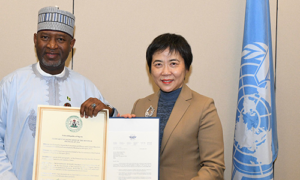 The Montreal Protocol 2014 (MP14)—the agreement that enhances the capacity of states to curb the rising incidence of unruly behavior on board aircraft—will come into force on January 1, 2020.
The Montreal Protocol 2014 (MP14)—the agreement that enhances the capacity of states to curb the rising incidence of unruly behavior on board aircraft—will come into force on January 1, 2020.
This follows the needed 22nd instrument of ratification which was deposited with the International Civil Aviation Organization (ICAO) by Nigeria on November 26, 2019.
MP14, properly named the Protocol to Amend the Convention on Offences and Certain Other Acts Committed on Board Aircraft, is a global treaty that strengthens the powers of states to prosecute unruly passengers.
The protocol closes a legal gap under the Tokyo Convention 1963, whereby jurisdiction over offenses committed on board international flights rests with the state where the aircraft is registered. This causes issues when unruly passengers are delivered to the authorities upon landing in foreign territories.
Unruly and disruptive passenger incidents on board flights include physical assault, harassment, smoking or failing to follow crew instructions. These incidents may compromise flight safety, cause significant delays and operational disruption and adversely impact the travel experience and work environment for passengers and crew.
“Everybody on board is entitled to enjoy a journey free from abusive or other unacceptable behavior. But the deterrent to unruly behavior is weak. About 60% of offenses go unpunished because of jurisdictional issues,” said Alexandre de Juniac, director general and CEO of the International Air Transport Association (IATA).
“MP14 strengthens the deterrent to unruly behavior by enabling prosecution in the state where the aircraft lands. The treaty is in force. But the job is not done. We encourage more states to ratify MP14 so that unruly passengers can be prosecuted according to uniform global guidelines,” he added.
States should also review the effectiveness of the enforcement mechanisms available to them in line with ICAO Guidance on Legal Aspects of Unruly and Disruptive Passengers (ICAO Document 10117) which gives information on how civil and administrative fines and penalties can be used to supplement criminal prosecutions.
The Montreal Protocol 2014, done in Montreal on April 4, 2014 amends the Convention on Offences and Certain Other Acts Committed on Board Aircraft, done in Tokyo on September 14, 1963 (Tokyo Convention 1963), according to ICAO.
“The Protocol addresses the issue of rising incidents of unruly and disruptive behaviour on board aircraft by significantly improving the ability of States to expand jurisdiction over relevant offences and acts to the State of landing and the State of the operator,” declared ICAO Secretary General Dr. Fang Liu.
“The Protocol will also serve to enhance global aviation security provisions by expressly extending legal recognition and protections to in-flight security officers.”
After the date of its entry into force, the Montreal Protocol 2014 shall no longer be open for signature but shall remain open for ratification, acceptance, approval or accession.
Photo courtesy of ICAO
